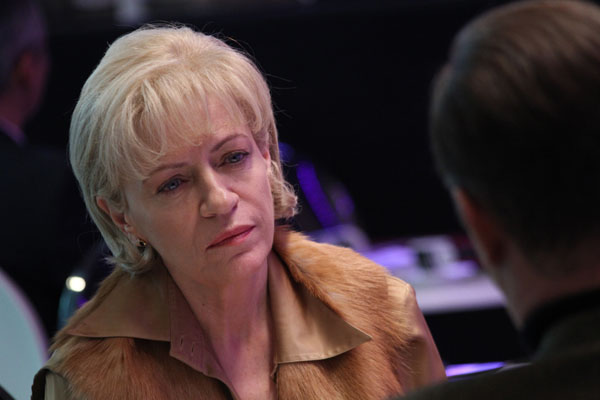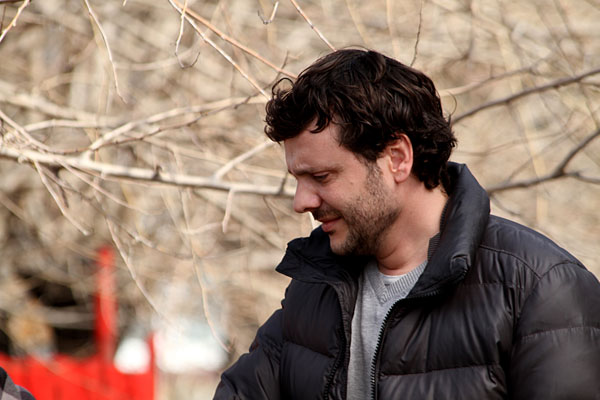“What is a definition of good Romanian cinema?” asks Nigel Andrews in the Financial Times. “Answer: Calin Peter Netzer’s Child’s Pose. Longer answer: the clinical anatomizing of people, society and relationships; drama as docu-pathology. From 4 Months, 3 Weeks and 2 Days and The Death of Mr Lazarescu (co-scripted by this film’s co-writer Razvan Radulescu) to Child’s Pose is a short leap down the corridor of the cosmic counseling clinic.” Winner of the Golden Bear at the Berlinale in February, Child’s Pose opens in the UK today and, as the Film Society of Lincoln Center’s Brian Brooks notes, will make its New York premiere as the Centerpiece of the upcoming Making Waves: New Romanian Cinema festival (November 29 through December 4).
When it screened in Toronto, Michael Sicinski reviewed it for Cinema Scope: “Cornelia (the great Luminita Gheorghiu), a wealthy architect with political connections, has a spoiled-prick son (Bogdan Dumatrache) who despises her, so much so that when he runs a poor kid down on the highway with his BMW she has to beg him to let her ‘fix’ the situation. What should be a study of post-communist generational conflict, the blithe application of privilege sucking the soul of the young people who actually toppled Ceausescu, is instead a dank, shaky-cam chamber piece filled with personal recriminations that echo no further than the immediate family—that is, until the final fifteen or so minutes, when Cornelia debases herself at the dead child’s wake. Only then does Netzer actually hit upon something substantial, allowing us to watch the distraught woman function as an unwitting synecdoche for a ruling class fighting for its life. It’s too little too late, but still, it’s power can’t be denied.”
“Child’s Pose pulls itself in multiple frustrating directions without fully developing a cohesive structure,” argues Nick McCarthy at the House Next Door. “After multiple scenes of Cornelia’s manipulative maneuvers and outright bribery, the narrative awkwardly morphs from strident socioeconomic treatise to Oedipal mother-son melodrama, hinting at revelations and setting up truth bombs that never explode, instead opting for a boisterously repetitious cycle of miscommunication and bullish behavior.”
David Jenkins at Little White Lies: “Cornelia is clearly some kind of monster—a female Gordon Gekko or T-1000 if you will—for whom human tragedy requires swiftly administered tactical manoeuvers, not contemplation or sorrow. Yet, all of this is done at the service of her son, her family, her reputation and her livelihood…. Netzer’s film is about moral decline, but it’s also about the survival instincts of the economic elites, always ready to channel their vast resources in order to overwhelm those underclass interlopers who might think of battering down the walls their paradise.”
In “its demonstration of how an act involving opposing families can be interpreted differently by each party,” Child’s Pose has brought Asghar Farhadi’s A Separation (2011) to the mind of many a critic, among them, Calum Reed, dispatching to In Review Online from the London Film Festival. “Netzer is less eager to disclose revelations and assign blame to his characters than Farhadi was, however, and he and co-scribe Razvan Radulescu do a wonderful job of converging the sides of the victim and perpetrator.”
“The film hinges on Gheorghiu and her vivid portrayal of Cornelia,” writes Kieron Tyler at the Arts Desk. “She appeared in Beyond the Hills, The Death of Mr Lazarescu and Michael Haneke’s Code Unknown, and is an actor of uncommon strength. The ambiguity and fragility she brings to the damaged Cornelia linger longer than impressions of the film itself.”
More from Peter Bradshaw (Guardian, 4/5), Trevor Johnston (Time Out London, 3/5), Geoffrey Macnab (Independent, 3/5), and Nathaniel Rogers.
Update, 11/9: Matt Thrift talks with Netzer for Little White Lies.
For news and tips throughout the day every day, follow @KeyframeDaily on Twitter and/or the RSS feed. Get Keyframe Daily in your inbox by signing in at fandor.com/daily.





